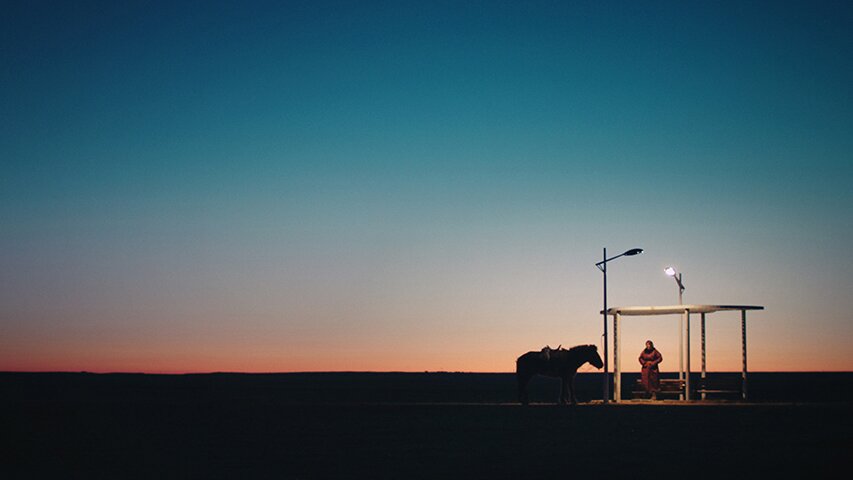“The technological advancement that mankind is so proud of has distorted us to some extent. Living in giant civilized cities makes it easy for us to forget the essential fact that we are just animals and part of the larger world. The nomadic way of life in Mongolia leaves people no choice but to maintain a much closer relationship with nature. Making a film in Mongolia provides a point of view for reflecting on the meaning of human civilisation from the perspective of nature. I am always longing for nature; in this sense I am Mongolian.”
– Wang Quan’an, Director

To understand China today and Wang’s reflection on the meaning of human civilisation, it is vital to reference the Cultural Revolution (1966 – 1976) whose sole aim was to preserve Chinese Communism by purging capitalism and reinstating Maoism. The year of the Pig (2019) marks the centenary of the May 4th Movement, in which nationalist student protests erupted in Beijing’s Tiananmen Square. It is seventy years since the founding of the People’s Republic of China and sixty years since the failed Tibetan uprising forced Dalai Lama to flee to India.

The country’s slow recovery has been watched with interest and despite a significant Chinese presence at the Berlinale this year, two films Zhang Yimou’s “One Second” and “Better Days” by Derek Kwok-cheung Tsang, due to be screened were yanked from the festival line up. It appears that the China today is in the centre of another political fever, in the form of an anti-corruption crackdown and a harsh stifling of dissenting views. Historical dehumanization, technological isolation and the loss of emotional participation in nature has resulted in global cosmic and social isolation. Wang Lina, a Chinese Director explains that “movies are born from the chaos of all people. What they record are not completed thought, but the formation of thought, a premise of faith.”

Wang Quan’an is a sixth generation Chinese filmmaker, which means he witnessed the aftermath of the cultural revolution and the surge towards capitalism in China. Quan’an, no stranger to the Berlinale Competition, won a Golden Bear for his moving and tragic Mongolian narrative, Truya’s Marriage (2006). This time, with ‘Öndög’ he is back with more magic, more drama and more romance. What begins as a suspenseful murder story, with the bare bloodied, buttocks of an abandoned woman found in the grassy plains of the steppe, slowly glides into something more poetic and existential.
We open on the wide-angle of the uninhabited landscape, the seductive setting sun and wild Mongolian horses. The lithe, desolate steppes suspends the horror of the crime into a duality between life and death. Time passes slowly, and policeman arrive to inspect the naked corpse. The unenviable duty of fighting off the wolves over night falls to 18-year-old rookie (Norovsambuu Batmunkh) left to keep watch over the body. We are led to believe momentarily that this is a detective story yet Wang’s muse is life, so we are invited to stay with the setting sun and darkness falling over the landscape.

The pace is deliberately slow as Quan’an explains that he “perceived a Mongolian sense of time” and the spectator is invited to witness the resolute, solitary independent herdswoman on camelback (Dulamjav Enkhtaivan), nicknamed “dinosaur” drift amongst this mythical landscape. The herdswoman, with a rifle strapped to her hip is drafted to assist the younger policeman through the night. Initially she is reluctant to assist him, for she has nomadic life rituals to attend to, but eventually she returns with freshly slaughtered lamb soup and a bottle of Hooch. The two settle in for the night with a roaring fire, snuggled up against the belly of her two-humped gigantic Bactrian Camel for warmth and shelter against the blisteringly cold wind.
‘Öndög’ which means an egg in Mongolian, is the key symbol throughout the film. It is presented in the form of a giant fossilised dinosaur gift or ‘Öndög’ given from the herdsmen (Aorigeletu) to the herdswoman he has loved since a child (Dulamjav Enkhtaivan). The ‘Öndög’ is ever-present in the visceral birthing of a calf, which the herdsman pulls out with his bare hands and whose brown, slimy embryonic sac stains his overalls in a lucid scene. Again, the ‘Öndög’ feels omniscient when the young policeman (Norozsambu) moans and fertilizes the herdswomen in an alcoholic sexual stupor the night they guard the corpse.

We witness the herdswoman on a horse in a state of temul: to”rush headlong, to be inspired or to have a sense of creative thought, and even to take a flight of fancy.” It can be seen from Mongolian perspective as “the look in the eye of a horse that is racing where it wants to go, no matter what the rider wants.”Quan’an skilfully creates a character that has the look in the eye of a woman who knows what she wants and has the patience to wait for it.

Beijing-based French cinematographer Aymerick Pilarski brings balance, credibility, significance and satisfaction to the aesthetics of the Mongolian steppes. Pilarski exploits the possibilities between photographic realism of the enormous sky and setting sun with the dramatic illusion of a splinter of land beneath it. The result is colourful patterns in motion and it’s feel like magic on the screen. Pilarski feels like he is guiding the camera through every gesture and expressing the natural through selective moments of perfection. As Carl Jung surmised in ‘The Earth Has A Soul’ “For it is the body, the feeling, the instincts, which connects us with the soil. If you give up the past you naturally detach from the past; you lose your roots in the soil, your connection with the totem ancestors that dwell in your soil. You turn outward and drift away, and try to conquer other lands because you are exiled from your own soil.”

‘Öndög’ is a blend of ancient and modern, solitude and union. This is a film that has no formal script or professional actors but rather exists suspended in a post-industrialised mirage, a Mongolian oasis seemingly unaffected by time or capitalism. Quan’an seeks consciousness and a sense of living history by returning to the primitive civilisation of man. The film’s truth is captured in the majestic herdswoman, the original source of ‘Öndög’ – or protein, a spring of nourishment from ancient times which continues to provide the path to a revered, independent nomadic way of life. No fixed abode or habitat, this pastoral way of living is almost as extinct as the “dinosaur” herself. Yet, as the spectator, we empathise with the herdswoman and her longing to connect with her baatar (Hero in Mongolian) and build a yurt to call home. This is a film about being connected and rooted in nature, and which if we allow it, can heal us all.



